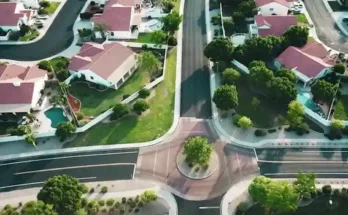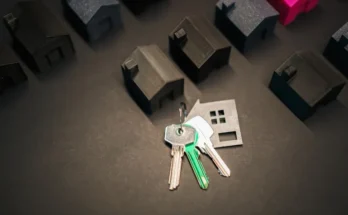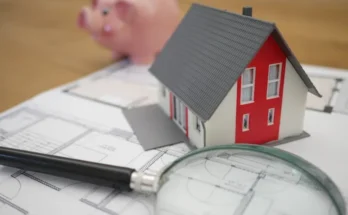Where Home Meets Investment:
Real estate is more than square footage and price tags. It is where human emotion meets financial ambition. A house is not just a structure. It is a story. An office space is not just a floor plan. It is a vessel for ideas. And land, untouched and raw, holds the dreams of what could be.
For centuries, people have built empires, communities, and legacies on land and property. Real estate touches every part of life. It influences how cities breathe, how families grow, and how cultures interact. From the first-time homebuyer walking into a modest apartment to the global investor studying property investment trends, real estate remains one of the most powerful forces shaping the human experience.
Understanding the Real Meaning of Real Estate:
- Not Just Property But Possibility
Real estate refers to land and anything permanently attached to it. That includes homes, buildings, roads, and natural features like trees and lakes. But behind the definitions and legal terms lies something much more compelling. Real estate represents potential. It is the canvas where people paint their futures.
Whether it is the warmth of a first home, the pride of a dream office, or the quiet vision of a future development, real estate is deeply personal. It is both a shelter and an opportunity. It is where lives unfold and wealth grows. It is where aspirations take form in wood, stone, and soil.
- A Bridge Between the Physical and Financial
At its core, real estate is the rare asset that is both emotional and economic. It is a place you can touch and feel, and also an investment that can change your financial life. A home may hold memories, but it can also appreciate in value. A commercial space may fuel a business, but it also represents income and equity.
This duality is what makes real estate unique among all forms of investment. It blends the tangible with the strategic, and for many, it becomes a lifelong pursuit of balance between comfort and capital.
The Different Faces of Real Estate:
- Residential Real Estate The Heart of Living
Residential real estate includes everything from urban apartments to countryside villas. It is where people rest, gather, and grow. These spaces form the backdrop of daily life, influencing everything from mental health to family bonds.
Buying or renting a home is one of the most emotionally charged decisions people make. It affects lifestyle, relationships, and financial stability. It is also a reflection of personality, priorities, and stage of life.
- Commercial Real Estate Spaces That Power Progress
Commercial real estate is where business meets the built environment. Office buildings, retail shops, hotels, restaurants, and warehouses all fall under this category. These properties generate income and drive economic activity. They are not just spaces. They are engines of employment, innovation, and trade.
The design and location of commercial property can make or break a brand. That is why companies often spend years refining their real estate strategy. A well-positioned space is not just functional. It is powerful.
- Industrial and Land The Backbone of Expansion
Industrial real estate and undeveloped land often work behind the scenes. Warehouses, factories, and logistics centers keep supply chains running. Meanwhile, open land holds the future in its soil, waiting for development, preservation, or transformation.
These sectors might be less glamorous, but they are essential. They support infrastructure, feed urban growth, and serve as strategic investments for those looking to build long-term wealth or shape the future of a region.
Why Does Real Estate Matters in Modern Life?
- Building Wealth and Security
For most people, purchasing a home is the largest financial decision of their lives. It is also the most powerful path to building equity. Real estate tends to appreciate over time, and owning property creates both stability and opportunity.
Unlike other investments, real estate allows for leverage. With a relatively small down payment, people can acquire high-value assets that grow in value while generating rental income or serving personal needs.
- Shaping Communities and Culture
Real estate defines how people interact with one another. A well-designed neighborhood invites connection. A thoughtful urban layout encourages safety, mobility, and access. Real estate development shapes the way communities look, feel, and function.
It is also a reflection of culture. Architectural styles, housing trends, and land use policies reveal what a society values. Whether it is walkable streets, high-rise living, or sustainable design, real estate captures the evolution of human priorities.
- Adapting to a Changing World
In the past decade, real estate has experienced dramatic shifts. The rise of remote work changed the demand for office space. Environmental concerns pushed the growth of green building. Urban sprawl met a new wave of compact, smart cities. And digital technology redefined how people buy, sell, and manage property.
These changes show that real estate is not static. It responds to economics, technology, climate, and culture. To thrive in this space, individuals and investors must stay informed and agile.
The Emotional Side of Real Estate:
- Home as Identity and Refuge
There is a reason why buying a home can bring people to tears. It represents more than walls. It is a sanctuary. A symbol of independence, love, and belonging. Whether rented or owned, a home carries the fingerprints of its inhabitants. It holds memories. It offers safety. It reflects dreams.
The emotional value of a home often outweighs its market value. That is why real estate agents, designers, and architects often act not just as professionals, but as listeners and guides through deeply personal journeys.
- The Weight of Decision and Commitment
Real estate decisions are not light ones. Whether you are buying, selling, leasing, or building, these choices require clarity, courage, and patience. Emotions run high because the stakes are real. A home purchase can change a family’s future. A failed deal can break a business. A development gone wrong can impact an entire community.
But with guidance, preparation, and vision, real estate becomes not a burden but a bridge to better possibilities.
Looking to the Future of Real Estate:
- Technology and Innovation
The future of real estate is being shaped by technology. Virtual tours, blockchain transactions, and data-driven valuation tools are making property more accessible and transparent. Smart homes with automated features are redefining convenience. Artificial intelligence is helping match buyers with properties more efficiently than ever before.
These tools will not replace the human touch, but they will empower it. Real estate will always be personal. Technology simply expands the possibilities. Industry professionals can join and engage with the insights community at the Real Estate Innovation Hub on LinkedIn, which accelerates thinking and connection among top residential real estate leaders including AI, PropTech, and smart data innovators
- Sustainability and Responsibility
Green building is no longer a trend. It is a responsibility. From solar panels to energy-efficient materials, real estate must adapt to the environmental challenges of our time. Developers and homeowners alike are recognizing the value of sustainability not just for the planet, but for long-term cost savings and community well-being.
As climate change reshapes where and how we live, real estate must lead the way with foresight and care.
Conclusion:
Real estate is not just about buying property. It is about buying into a future. It is about claiming space in the world and deciding how that space will serve you and others. It is an act of imagination and courage, strategy and heart.
Whether you are a first-time buyer, a seasoned investor, a renter finding your way, or a developer creating something new, you are part of a story bigger than buildings. You are helping shape the world we live in.
And that makes real estate one of the most human fields there is.




